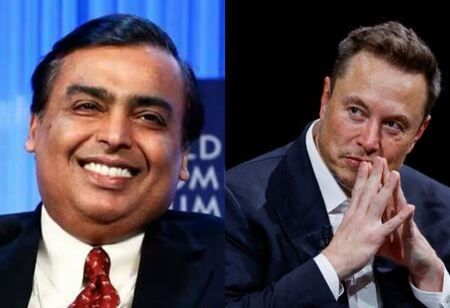
Ambani, Musk Lock Horns on Spectrum Allocation Vs Auction


The lengthy debate about how satellite spectrum allocation vs auction finally reached a conclusion last week, which declared spectrum allocation. The Union Minister Jyotiraditya Scindia announced that satellite services will be distributed in line with international practices administratively and ruled out spectrum auction in India. The allocation will be set with a price that is payable on a first-come, first-served basis, as opposed to the India telecom auction. Although the telecom industry made India one of the fastest countries to roll out 5G services after the 5G spectrum auction, this year’s decision has made the country follow what every other country is doing.
Satellite broadband services may promise greater connectivity, especially in places with inadequate infrastructure. But it comes at an exorbitant price compared to other mobile services. In India, Airtel and Jio have long been providing networks across an array of network frequencies to customers. Over time, the two major telcos started to give a hand at satellite broadband services to help spread the connectivity to every part of the country.
In light of that, the Indian government decided to announce telecom regulation last year, stating that the administrative distribution of satellite communication spectrum is an exception. Soon after that, the Telecom Regulatory Authority of India, the country's regulatory body, released a consultation document (PDF) that examined the process and cost of allocating spectrum to satellite operators. Ever since then, there has been much heated debate on the distribution of spectrum for satellite services in India. While Mukesh Ambani placed his vote for an auction mechanism, Starlink and other telcos like Amazon's Project Kuiper raised their hands for an administrative allocation.
Elon Musk vs Mukesh Ambani
The CEO of Starlink, Elon Musk, expressed his opposition to the bidding procedure. In his defense, he stated that the ITU's international practices, which conflict with the auctioning off of satellites like mobile spectrum, should not be followed.
Musk believes that satellite spectrum has to be shared rather than sold to be used fairly and effectively.
Another new company that has pushed for shared spectrum allotment is Amazon's Project Kuiper, which is also aiming to break into the Indian broadband market.
For Reliance Jio, the satellite spectrum market meant that it should be put up for auction, which ensures fair competition. The telco said this in consideration of the competition turning more fierce when international telecom service providers like Starlink provide data and communication services. Therefore, Mukesh Ambani urged TRAI to overrule their ruling and support the auction procedure.
Another Indian telco that is also in agreement with Reliance Jio’s stance is Bharti Airtel. Bharti Airtel’s CEO, Sunil Mittal, agrees that satellite operators should adhere to the same rules as other telecom companies, which include bidding for spectrum.
Spectrum Allocation is Crucial to Make Way for International Telcos
The decision on satellite spectrum is crucial for the allocation of valuable, limited spectrum for new communications offerings, but also since it could pave the way for the arrival of Elon Musk and his Starlink satellite services into India's lucrative telecommunications sector.
Challenges of Starlink Entering in India
Elon has long voiced his interest in offering Starlink’s services in India, but unsolved concerns with spectrum allotment continue to be a major roadblock. The challenges range from pricing dynamics and regulatory obstacles to the separate demands of India's rural market.
Pricing Challenges
Let’s start with pricing, which is a major stumbleblock for Starlink. The company charges a premium for its services abroad, which makes its service appeal much more obvious when the price is converted to Indian rupees in comparison to local options. For instance, Starlink's most reasonable monthly package starts at about $50 (about Rs 4,200). Now, Reliance JioFiber starts at Rs 399 (excluding taxes) per month, and Airtel Xstream Fiber options start at Rs 499 (excluding taxes) per month. This indicates that India has some of the lowest internet prices in the world, especially now that Reliance Jio and Bharti Airtel have started offering 5G services.
This makes rural consumers unlikely to pay significant amounts for satellite internet services like Starlink, while they are offered affordable services from Reliance Jio and Bharti Airtel. Even if Starlink manages to handle the expense issue, it still has to deal with a lot of regulatory obstacles, especially adjusting to India's licensing system.
A Lot of Regulatory Papers to Sign
According to Indian telecom legislation, any communication service must have a Unified Access Service Licence (UASL), as opposed to other nations, where administrative guidelines are generally used to distribute the spectrum for satellite communication.
One license could allow service providers to deliver a variety of telecommunications services, such as satellite communications, data, and voice, thanks to the UASL, a comprehensive license. This regulatory structure is intended to ensure that operators fulfill particular rollout responsibilities, uphold quality standards, and pay licensing fees that support government coffers.
For Starlink, this mandate poses a major barrier to entry, making it challenging to provide services rapidly without having to clear a number of regulatory red tape hurdles.
Market Density in Rural Areas
On top of that, India's rural areas lack market density even though they require improved connection. Rural India is frequently crowded, which weakens the argument for pricey satellite-based internet services. The cost-benefit ratio just does not compare favorably to the fast rising availability of reasonably priced 5G services.
Even though Bharti Airtel and Reliance Jio used to be rivals, their positions on spectrum distribution have changed, and this has affected the dynamics between the telecom companies in India.
Through its collaboration with OneWeb, Airtel is already offering satellite-based internet services and setting up ground stations in Gujarat and Tamil Nadu. The difficulties Musk's business could encounter in establishing a presence in the Indian market pose less competition to Airtel due to its current position.